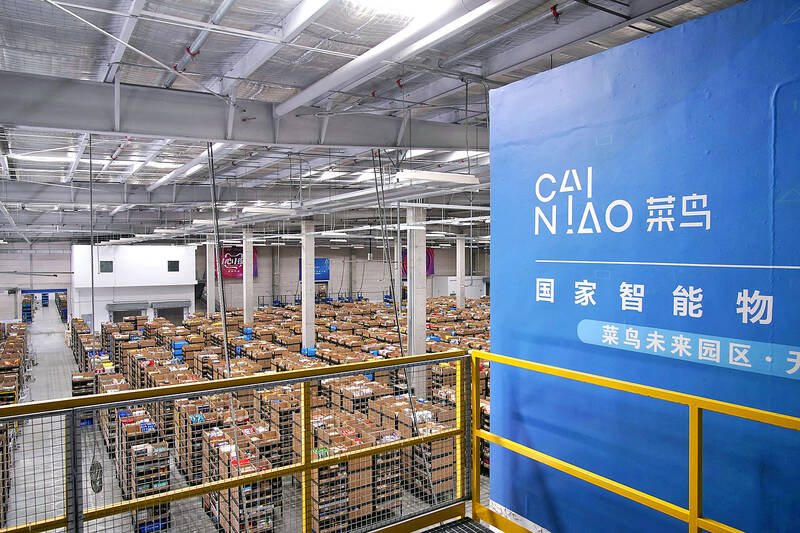Belgium’s intelligence service has been monitoring the main logistics hub in Europe of China’s Alibaba Group Holding Ltd (阿里巴巴) over concerns of possible espionage, the Financial Times reported yesterday.
Referring to the company’s logistics center at a cargo airport in the city of Liege, the security service said it was working to detect “possible espionage or interference activities” by Chinese entities, including Alibaba, the newspaper said.
Alibaba denied any wrongdoing, it added.

Photo: Reuters
Alibaba and the Belgian State Security Service did not immediately respond to requests for comment.
Alibaba signed an agreement with the Belgium government in 2018 to open an e-commerce trade hub, run by its logistics arm Cainiao Smart Logistics Network Ltd (菜鳥網路), that would include investment in logistics infrastructure.
The newspaper, citing people familiar with the matter, said the Belgian security service was monitoring the company’s operations “following intelligence assessments,” with one area of scrutiny being the introduction of software systems that collate sensitive economic information.
The Belgian security agency told the newspaper that presence of Alibaba “constitutes a point of attention” for it because of legislation forcing Chinese companies to share their data with Chinese authorities and intelligence services.
Alibaba last month filed to list Cainiao on the Hong Kong stock exchange, which would make the unit the first to be separated since the Chinese e-commerce giant said earlier this year that it would restructure and split its business into six units.

The New Taiwan dollar is on the verge of overtaking the yuan as Asia’s best carry-trade target given its lower risk of interest-rate and currency volatility. A strategy of borrowing the New Taiwan dollar to invest in higher-yielding alternatives has generated the second-highest return over the past month among Asian currencies behind the yuan, based on the Sharpe ratio that measures risk-adjusted relative returns. The New Taiwan dollar may soon replace its Chinese peer as the region’s favored carry trade tool, analysts say, citing Beijing’s efforts to support the yuan that can create wild swings in borrowing costs. In contrast,

Nvidia Corp’s demand for advanced packaging from Taiwan Semiconductor Manufacturing Co (TSMC, 台積電) remains strong though the kind of technology it needs is changing, Nvidia CEO Jensen Huang (黃仁勳) said yesterday, after he was asked whether the company was cutting orders. Nvidia’s most advanced artificial intelligence (AI) chip, Blackwell, consists of multiple chips glued together using a complex chip-on-wafer-on-substrate (CoWoS) advanced packaging technology offered by TSMC, Nvidia’s main contract chipmaker. “As we move into Blackwell, we will use largely CoWoS-L. Of course, we’re still manufacturing Hopper, and Hopper will use CowoS-S. We will also transition the CoWoS-S capacity to CoWos-L,” Huang said

Nvidia Corp CEO Jensen Huang (黃仁勳) is expected to miss the inauguration of US president-elect Donald Trump on Monday, bucking a trend among high-profile US technology leaders. Huang is visiting East Asia this week, as he typically does around the time of the Lunar New Year, a person familiar with the situation said. He has never previously attended a US presidential inauguration, said the person, who asked not to be identified, because the plans have not been announced. That makes Nvidia an exception among the most valuable technology companies, most of which are sending cofounders or CEOs to the event. That includes

INDUSTRY LEADER: TSMC aims to continue outperforming the industry’s growth and makes 2025 another strong growth year, chairman and CEO C.C. Wei says Taiwan Semiconductor Manufacturing Co (TSMC, 台積電), a major chip supplier to Nvidia Corp and Apple Inc, yesterday said it aims to grow revenue by about 25 percent this year, driven by robust demand for artificial intelligence (AI) chips. That means TSMC would continue to outpace the foundry industry’s 10 percent annual growth this year based on the chipmaker’s estimate. The chipmaker expects revenue from AI-related chips to double this year, extending a three-fold increase last year. The growth would quicken over the next five years at a compound annual growth rate of 45 percent, fueled by strong demand for the high-performance computing